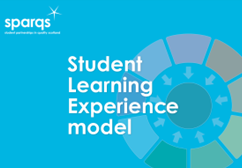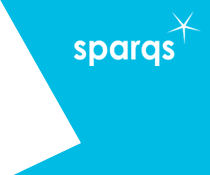
In June 2021, the Scottish Funding Council (SFC) published its final report of its Review of Coherent Provision and Sustainability. One of the recommendations in the report was to develop a single tertiary approach to quality for colleges and universities.
This new approach seeks to put the experiences of students at the centre of the sector’s approach to quality. To facilitate this, SFC commissioned sparqs to develop a shared sector reference point - the Student Learning Experience model, launched in October 2023.
The Model
The model was developed by students in partnership with staff across the sector, in order to be focused on what matters most to our students. The model is designed to sit at the heart of conversations with students, enabling students and staff to work together to identify priorities to enhance the quality of learning. It plays a key role in Scotland’s quality arrangements and will continue to evolve alongside the tertiary approach to quality.
The new SLE model is comprised of 9 building blocks. These are the key elements that make up the learning experience. They support students to begin to consider the distinct aspects of their experience which come together to provide a high-quality student learning experience. The model is underpinned by 3 lenses. These are areas of focus that can be applied across all 9 of the building blocks. The resource will be updated during the 2023-24 academic year, to allow institutions and students to apply the lenses to the model in order to highlight aspects across the learning experience that relate to these 3 areas. Each building block has an accompanying set of 10 reflective questions. The questions support dialogue between students and staff on various aspects of the building blocks. They will help develop an understanding between students and staff of strengths within the student experience, as well as areas for development.

.
Development of the model
In developing this model, we built on our existing Student Learning Experience (SLE) tool. The existing tool has been used widely across the sector for many years and is the foundation of the training that sparqs delivers to course representatives. The tool breaks the SLE into several building blocks, each of which has a set of accompanying questions that support students to think about the quality of their learning. The aim of the redevelopment was to review the building blocks and their accompanying questions to create a shared reference point, which is focused on the views and needs of students studying in Scotland and shaped by a range of research and discussion between students and staff.
To develop the tool, sparqs undertook a piece of desk research, exploring a range of existing sector reference points and research that explored the SLE and setting out principles for the types of activity that contribute to excellence in the student experience. Reference points used include the UK Quality Code; Our Best Future (Education Scotland); a range of student surveys, including the National Student Survey (NSS), Student Satisfaction and Engagement Survey (SSES), and Postgraduate Taught Experience Survey (PTES); professional standards for teaching staff in both universities and colleges and some international reference points. The desk research suggested 12 potential areas which were eventually developed into the 9 ‘building blocks’, underpinned by the 3 'lenses' in the final model.
Over the summer, sparqs piloted a workshop, prior to rolling it out across the autumn/winter term of the 2022-23 academic year. We delivered an adapted version of this workshop to colleagues at our May 2023 joint meeting of our advisory groups and networks (JAG, NEON and SESN); student officers and students’ association staff at our That’s Quality! residential; and to student rep trainers at our Associate Trainer residential. These pilot workshops served a dual purpose – to begin the data gathering exercise to shape the new SLE model, and to gather initial feedback from experienced staff and students on the workshop itself and how we could most effectively deliver it across Scotland.
Phase 1 – September 2022 to January 2023
In line with the SFC’s intention to ensure this work is fully centred on the views of students, the SFC asked sparqs to undertake a major piece of work with students studying across the tertiary sector, to explore the key principles and approaches that constitute an excellent Student Learning Experience.
In phase 1 of this project (from September to January), sparqs worked with students to identify the principles of the Student Learning Experience that matter most to them. This took the form of a series of workshops with student reps and diverse student groups across Scotland. These workshops were designed to capture the views of students on what makes a good student learning experience.
We arranged sessions with students’ associations and institutions to run workshops with their students. These workshops were facilitated by sparqs’ Development Consultants, with some workshops delivered online and some in-person, depending on the format which worked best for the institution. 21 workshops took place across Scotland’s colleges and universities during Phase 1 of the project, in addition to the 3 pilot workshops delivered during summer 2022.
In phase 1 sparqs engaged with 301 students from Scotland’s colleges and universities. We ran institution-specific workshops with the following institutions: Dumfries & Galloway College, Forth Valley College, UHI Inverness, North East Scotland College, New College Lanarkshire, South Lanarkshire College, West College Scotland, West Lothian College, Abertay University, University of Dundee, University of Glasgow, Heriot-Watt University, Queen Margaret University, University of St Andrews, University of Strathclyde and the University of Stirling.
In this workshop series, we wanted to ensure that we were hearing from a diverse range of students from different demographics and levels of study, to ensure that the model works for all students however and wherever they learn. We therefore ran some workshops for specific groups of the student body, including international students; widening access students; and LGBT+ students. We also ran workshops with students studying at several levels of study and types of course, including modern and graduate apprentices, undergraduates across all year groups, postgraduate taught students, senior phase school pupils studying at college, and students studying on supported education programmes.
We would like to thank all the students who took the time to participate in these workshops and share their thoughts, your contributions are hugely valuable and will play a key role in setting the agenda for conversations about the student learning experience in Scotland for many years to come. Our thanks also go to the students’ associations and institutions who volunteered to host a workshop and supported their successful running.
Phase 2 - January to May 2023
In Phase 2 of the project, sparqs began by undertaking an initial thematic analysis of the principles data gathered in Phase 1. From this analysis, sparqs identified an initial longlist of draft principles under each of the building blocks. These principles, and the wider phrasing and structure of the building blocks themselves, were consulted upon and workshopped with students and staff across the sector at several national committees and events - we wanted to ensure that there was consensus at a sector-level on the model, so that, whilst it is centred on what students have said, it is owned by everyone. Sector committees and events we attended include:
- CDN Quality Development Network
- College Vice Principals' Network
- National Education Officers’ Network (NEON)
- Scottish Higher Education Enhancement Committee (SHEEC)
- Student Engagement Staff Network (SESN)
- The Quality Forum (TQF)
Alongside this sector consultation activity, sparqs established a student and staff consultative group. This group comprised volunteers from our existing networks (our Joint Advisory Group (JAG), NEON and SESN) as well as individuals with sector expertise on topics we need the model to support, such as EDI, digital learning and sustainability in the curriculum. This group helped to develop sections of the model in more detail, including considering key aspects of the model, such as how it would address the diversity of the student body and ensuring the model can be used for all modes of study, e.g. FE, HE, Apprentices and PGT, etc.
Next steps: 2023-24
The new SLE model was launched in October 2023. During the next academic year, sparqs will continue to develop the model’s underpinning lenses, in order to allow students and staff to consider the full breadth of the learning experience through three areas of focus: equality, diversity and inclusion; mental health and wellbeing; and sustainable development.
In 2023-24, sparqs will work with the sector to embed the SLE model within forthcoming quality arrangements and to create supporting guidance for students’ associations and institutions to use the model across a range of activities.
Suggested uses for the SLE model include:
- as a basis for student rep training.
- to collate evidence on the learning experience for use in in self-evaluation and enhancement planning.
- as a reference point for review teams in internal and external review.
.
Further information
For further information, or if you have any queries, please contact Megan Brown, Development Consultant – megan.brown@sparqs.ac.uk.


